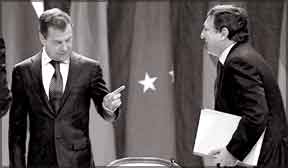Medvedev makes nice with the EU
By Stephen Castle
KHANTY-MANSIYSK, Russia: The food was nouvelle cuisine, the wine was
French and coffee was served on a terrace with spectacular countryside
views. At his first summit meeting with the European Union, the new
Russian president, Dmitri Medvedev, dispensed with the aggressive
rhetoric of his predecessor, Vladimir Putin, and tried a new tactic on
the Europeans: being nice to them.
Six hours' flying time from Brussels, in the heart of the Russian
oil-producing region, the EU and Russia on Friday opened long-awaited
negotiations on a partnership agreement, saying that a "new page" had
been turned in their fractious dealings.
From the moment the top EU officials met with their Russian
counterparts for a dinner Thursday night preceding the formal
negotiations, the Europeans noted the contrast between the 42-year-old
former lawyer, Medvedev, and his more hard-nosed predecessor.
|

President Dmitri Medvedev of Russia speaking with the
European Commission president, José Manuel Barroso, before
the summit meeting on Friday. - Reuters |
According to one EU official present at the restaurant, which
overlooks the confluence of two Siberian rivers, Medvedev seemed almost
shy at the start of the meal of borscht en gelée followed by pheasant,
allowing others to open subjects for debate rather than laying down the
law.
When discussing the allocation of visas to Europeans working in
Russia, the president said that Moscow had been in the wrong. Returning
to their lavish official guest houses in a Siberian forest, the most
important guests found they had been left a signed book of Medvedev's
amateur photographs.
Then, on Friday, over a working lunch, Medvedev tried a joke, an EU
official reported. Yes, Medvedev said, the leaders may have had to
discuss some boring things, but at least they got something to eat.
The contrast with summit performances of Medvedev's judo-loving,
KGB-trained predecessor could barely be more stark. In 2006, when he was
challenged over the rule of law in Russia at a dinner, Putin turned on
Italy's then-prime minister, Romano Prodi, reminding him bluntly that
"mafia" was not a Russian word.
At a news conference four years earlier, Putin suggested that a
journalist who asked about Chechnya was a Muslim radical who ought to
get himself circumcised.
And the EU-Russia summit meeting last year in Samara ended in
acrimony when Moscow detained Russian activists intent on protesting
against the government. This prompted angry comments from the German
chancellor, Angela Merkel, and Putin.
Putin, who is now prime minister, has hardly disappeared from the
scene, though during the dinner Thursday in Khanty-Mansiysk, his name
was not mentioned, according to another EU official present.
But EU participants said their side had left Siberia feeling no
clearer about the balance of power within a complex Russian
administration or even the division of responsibilities, between the
prime minister, who heads the government, and the president.
Nevertheless, for Medvedev there was lavish praise.
"I saw someone with whom I believe we can work in a good spirit,
someone who is open and relaxed," said the European Commission
president, José Manuel Barroso.
He added that Medvedev was someone who "is open and who really wants
to engage in discussion." Others saw a politician less concerned than
Putin about asserting Russia's place in the world and about making up
for the humiliations of the 1990s.
"I think he is from a new generation and I think he sees Russia
already back as a global player," said Benita Ferrero-Waldner, the
European external relations commissioner. "I think he wants to use this
potential and sees the chance of a close relationship with the EU."
But tensions between the two sides remain, most notably over energy
and trade issues, including duties on Russian timber that prevent
Finnish furniture-makers from importing wood.
Also, the Russians and Europeans disagree over the form of the new
partnership agreement they seek.
Medvedev said that the document will be "short, without too many
details," and that it could be supplemented later with agreements on
specific issues. That contrasted with the EU position that it should be
detailed and cover all areas of the relationship.
At the dinner Thursday, Medvedev referred at length to his proposals
to revamp Europe's security architecture, a EU official said. That was
interpreted as a sign that he intended to press ab idea that has
received a cool response in Europe. And he called for a new global
partnership among energy producers, transit companies and consumers.
EU officials see that as an effort to sidestep the Energy Charter,
which Russia has signed but not ratified, and which obliges it to
liberalize its oil and gas sector.
Medvedev reiterated Putin's criticism of the EU over the rights of
Estonian and Latvian Russian speakers, as well as opposition to U.S.
missile defense plans.
There was, however, little disguising the relief with which EU
officials greeted the first summit meeting of the Medvedev presidency
and the arrival of a man who seems to want to talk to them, rather than
at them.
"My first impression," said Ferrero-Waldner "was a very positive one.
I was impressed by the president and I think he means what he says."
But Barroso said plans were under way to hold regular meetings
between the European Commission and the Russian government, including
Putin, possibly starting in October.
That means the EU's top officials may not have seen the back of those
ill-tempered dinners with Putin.
-Russia Times |
